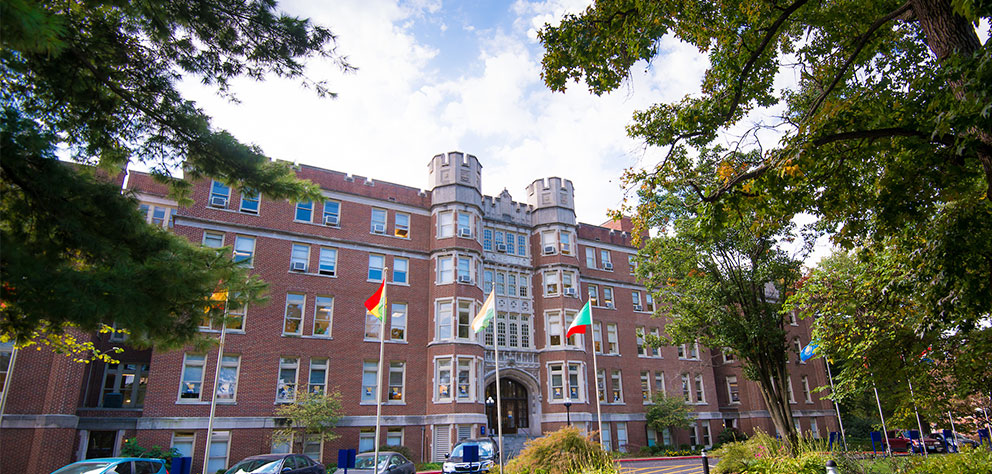Webster University Receives $1 Million Grant to Improve County Mental Health Services
June 14, 2021
Webster University received a federal grant of more than $1 million to work with the St. Louis County Department of Public Health and other community health organizations to identify and treat mental health issues in patients from immigrant and underserved communities who are seeking medical treatment, it was announced this week.
The four-year grant will be overseen by Professor Muthoni Musangali in the Webster University College of Arts and Sciences Department of Professional Counseling, along with Associate Professors Hasmik Chakaryan and Molly Stehn. The grant was issued by the U.S. Department of Health and Human Services through its Behavioral Health Workforce Education and Training program.
“This grant will further strengthen Webster’s historic focus on diversity and cultural awareness and our ability to assist and make difference in the communities we serve,” said Webster University President Julian Z. Schuster. “We are proud of the work that Dr. Musangali and the Webster’s entire team and for their continued efforts which made this grant proposal a reality.”
The grant for $1,083,454 will be distributed between July 1, 2021 and June 30, 2025. This is not Webster’s first grant from the Department of Health and Human Services, but it is Webster’s first Behavioral Health Workforce Education and Training Grant. Musangali will serve as the project lead and will work closely with Professor Hasmik Chakaryan and Professor Molly Stehn.
Mental Health Services for High-Need, Underserved Populations
Through this grant, Webster University will partner with the St. Louis County Department of Public Health and other community agencies to implement a clinical case management/ecological model to improve the delivery of mental health services to high-need and underserved populations within the greater Saint Louis region. This innovative model addresses “trauma-informed care, historical, cultural/religious factors shaping minority attitudes toward healthcare, and cultural and linguistic diversity.” Counselors will be specially trained to identify mental health issues in patients who are entering various medical intake offices in the county and then make sure that the mental health issues are addressed along with the medical issue that was first being diagnosed. The program will pay special attention to immigrants and those from underserved neighborhoods.
“Individuals in high-need and high-risk populations will more readily seek help for a medical condition than a mental health concern. As a result, many people remain at risk and do not seek or access the help they need,” Musangali said. “By partnering with Saint Louis County Department of Public Health to conduct screenings at primary care locations, we will identify those that need targeted help to address the mental health issues.”
Studies have shown that the shortage of highly trained behavioral health practitioners places low-income individuals, immigrants, refugees and residents of underserved communities at risk for significantly higher rates of untreated mental health issues. Those untreated mental health issues can then lead to more serious problems that end up being more complex and expensive to address over time.
“We have to make sure we have counselors serving these communities, using counseling approaches that are culturally appropriate,” Musangali said. “We will bridge the divide between people and services and build those important connections to help address the underlying psychological issues before they manifest into something much more serious.”
Culturally Responsive Model of Counseling
The grant will be used to train student counselors on how to use a culturally responsive model of counseling through the Webster University Institute of Clinical Scholarship (WICS). Students will be offered paid internships to work at St. Louis County locations to conduct brief psychological screenings of all patients and assess whether mental health follow-ups are needed. Those future meetings could be online or by phone, to help targeted populations overcome disproportionate challenges with job flexibility or access to transportation.
“This project breaks new ground in the life-changing impact that can be achieved through strategic public-private partnerships,” said Webster University Chancellor Elizabeth (Beth) J. Stroble. “We are proud to achieve this level of federal and local support to address the disparities present in access to appropriate mental health resources. Lives will be changed through this partnership as Webster continues its mission of meeting unmet needs.”
Stehn, chair of the Department of Professional Counseling, is enthusiastic about both the opportunities the grant presents to students and for the positive impacts on the department. “The WICS institute, which this grant makes possible, will be a fulfillment of the department’s ideals of equity and dignity for all in need of emotional healing,” Stehn said. “The students chosen to be WICS scholars will have demonstrated the highest academic achievement and will exemplify cultural responsiveness and sensitivity.”
Webster University Counseling interns are required to complete an internship as part of the training for their degree program, and the opportunity for paid internships will incentivize Webster students to complete their internships in low-income high-need areas of St. Louis, Musangali said. She added that students tend to find jobs in the areas where they completed those internships. As a result, everyone in the project is hopeful the majority of students will stay on and continue to work in those areas when the internships are completed, thereby increasing the number of counselors in the region who have received specialized cultural training needed to work with immigrant and undeserved communities.
“We are going to be very busy in the next year establishing all of these systems, but I am optimistic that we will be successful,” Musangali said. “This is very ambitious, but we have a great team and great partners and wonderful students.”

